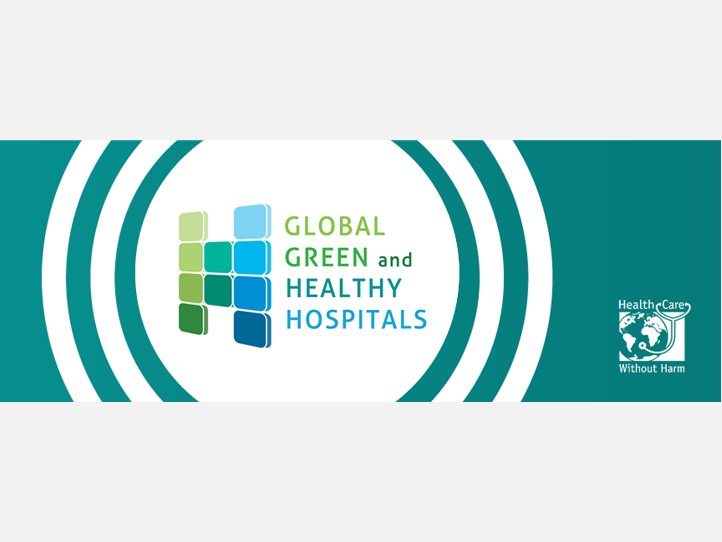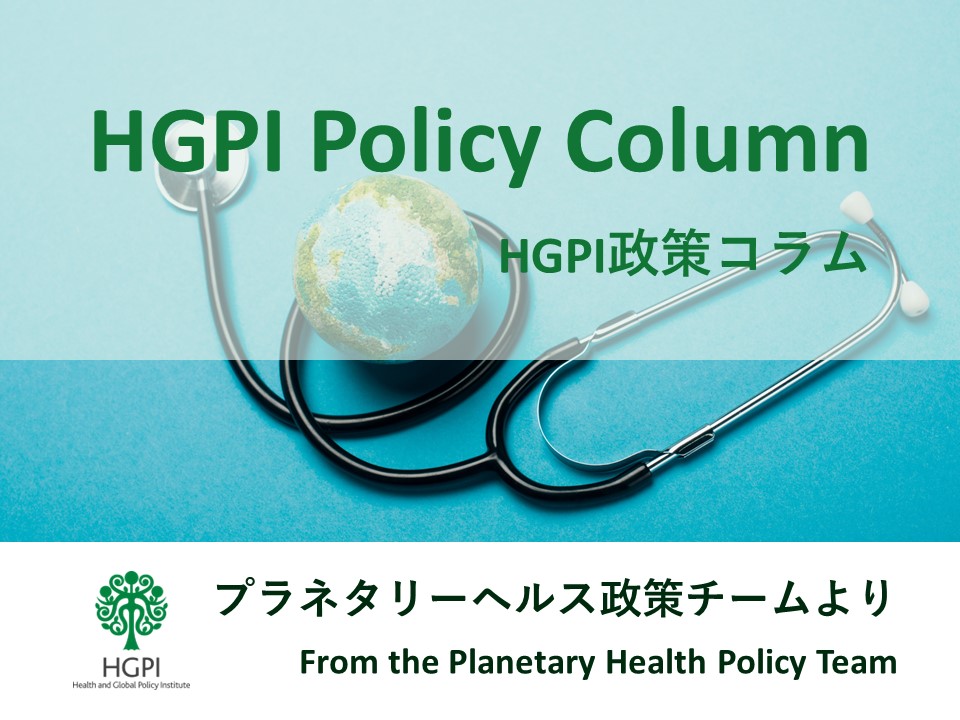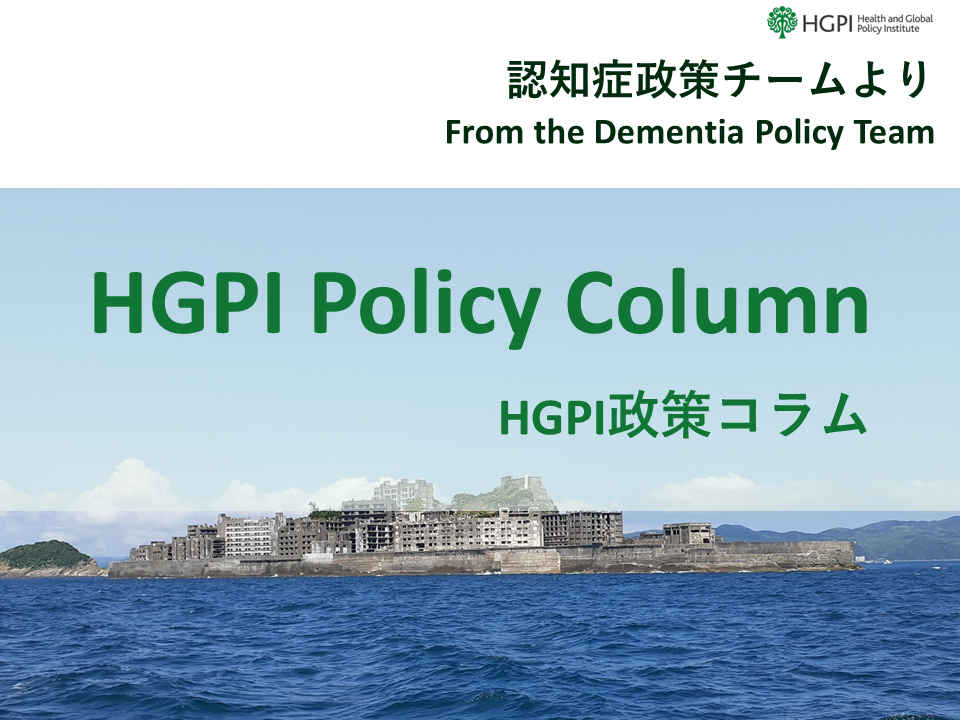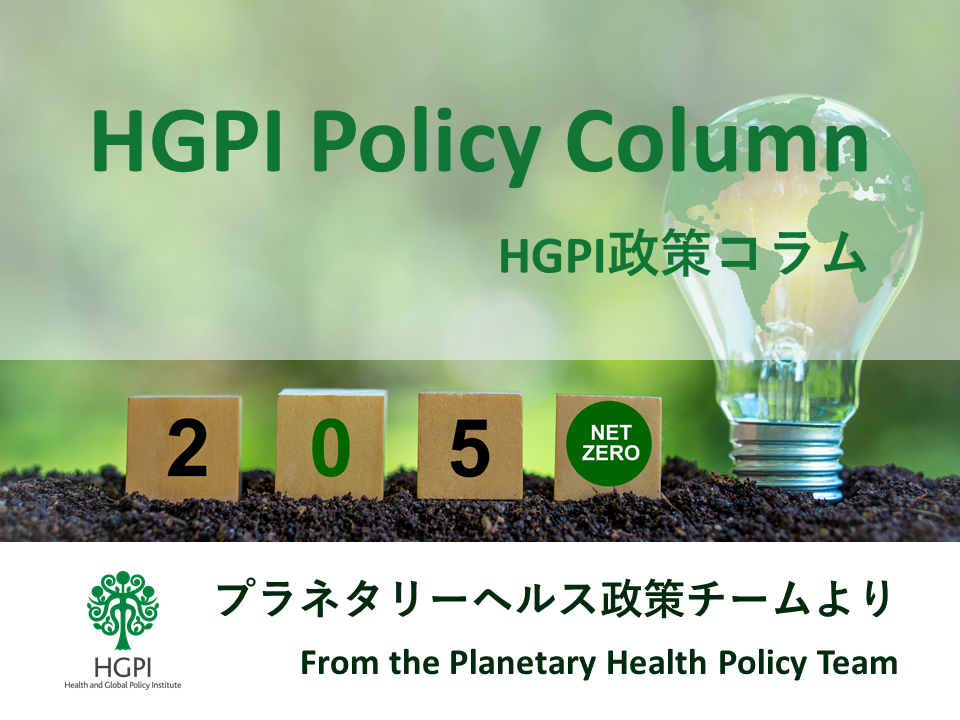[HGPI Policy Column] No. 39 – From the Planetary Health Policy Team, Part 6 – Ensuring a Healthy and Sustainable Future for the Health Care Industry: the Case of Global Green and Healthy Hospitals
date : 10/23/2023
![[HGPI Policy Column] No. 39 – From the Planetary Health Policy Team, Part 6 – Ensuring a Healthy and Sustainable Future for the Health Care Industry: the Case of Global Green and Healthy Hospitals](https://hgpi.org/en/wp-content/uploads/sites/2/column-38-top_JPNENG-2.png)
With the growing movement toward decarbonization and reducing the environmental footprint, various efforts are being made in different industries. This column will highlight the work of Global Green and Healthy Hospitals (GGHH), a global initiative to reduce the environmental footprint of the healthcare industry. The column will also share some case studies submitted by hospitals and organizations that are members of GGHH.
<Key Points>
- GGHH is an international network of hospitals and medical institutions around the world dedicated to addressing environmental issues
- GGHH proposes alternatives to healthcare activities that cause pollution and disease, with the potential to benefit both human health and the environment
- The 10 goals of the GGHH provide a roadmap for reducing the environmental footprint of the healthcare industry and promoting public and environmental health
- GGHH members have access to resources such as action plans and best practices from member organizations that can help other members move forward with their own initiatives
Background
The healthcare industry accounts for 4.4% of total global greenhouse gas (GHG) emissions, and its decarbonization will have a significant impact on global decarbonization [i]. According to a 2011 study of the total greenhouse gas emissions of the Japanese healthcare industry,[ii] the healthcare industry emitted 72 million metric tons of carbon dioxide (CO2), or approximately 5.2% of Japan’s total greenhouse gas emissions.
Efforts in the healthcare industry have gradually begun. These efforts to reduce the healthcare industry’s impact on the environment, both domestically and internationally, were highlighted in the Planetary Health Policy Column “– From the Planetary Health Policy Team, Part 3 – Healthcare Sector Initiatives for Planetary Health”.
Since the launch of the Planetary Health Project last year, Health and Global Policy Institute (HGPI) has been working on issues related to the impact of environmental problems on health, the negative effects of the healthcare industry on the environment, and recommendations to break this cycle. In addition, in order to participate in the global planetary health discussion, we officially joined GGHH in July 2023 as the first member from Japan. With our recent participation in the GGHH, this collum will introduce the efforts of GGHH.
About GGHH
GGHH is an affiliate of Health Care Without Harm (HCWH). HCWH was founded in Bolinas, California by a group of 28 organizations after the U.S. Environmental Protection Agency identified medical waste incineration as the leading source of dioxin, one of the most potent carcinogens. HCWH works to implement ecologically sound and healthy alternatives to health care practices that pollute the environment and contribute to disease. During COP26, held in Glasgow, United Kingdom, from October to November 2021, HCWH, in collaboration with the UK Government and UN Climate Change High-Level Champions, promoted the COP26 Health Program at the United Nations Framework Convention on Climate Change (UNFCCC) negotiations.
GGHH, an initiative of HCWH, is an international network of hospitals, health care facilities, health systems, and health organizations dedicated to reducing their environmental footprint and promoting public and environmental health. The network works to transform the healthcare sector through innovation, ingenuity, and investment to transform the health sector and foster a healthy, sustainable future. Hospitals, hospitals, health care facilities, health systems, and health organizations can become members, and each type of institution has a set of commitments. Healthcare institutions are required to implement two or more goals and are encouraged to share case studies annually, which are available to GGHH members. Members also receive access to GGHH Connect, which includes the Hippocrates Data Center, a platform that tracks, stores, and visualizes data, as well as case studies submitted by GGHH members.
10 Goals
GGHH’s work is based on a comprehensive framework of 10 interconnected goals for the health sector to address and promote greater sustainability and environmental health. These 10 goals are designed to help health care institutions around the world promote and create greater sustainability and environmental health while improving the health of patients, communities and the planet. Based on these ten goals, the GGHH website identifies areas of environmental concern caused by the healthcare industry and action plans to address them. The following is the summary of the 10 goals listed on the website.
- Leadership: Prioritize environmental health
Leadership is essential to promoting green and healthy hospitals, and this goal means that leadership must make environmental health, safety and sustainability key organizational priorities. In addition, incorporating these priorities into education, goal setting, accountability, and all external relations and communications can significantly change the culture of the organization, whether it is an individual hospital, a health system, or a ministry of health.
- Chemicals: Substitute harmful chemicals with safer alternatives
Exposure to toxic chemicals begins before birth and continues throughout life, and many of these chemicals have been linked to serious illnesses. The health care sector, whose mission it is to protect human health, is a major consumer of chemicals and contributes to the burden of disease. By addressing chemical exposure in health settings, the health sector can not only protect people’s health, but also actively demonstrate the safe management of chemicals thereby leading by example.
- Waste: Reduce, treat and safely dispose of healthcase waste
Hospitals generate a large amount of waste each year, and the burning of medical waste produces a number of hazardous gases and compounds. Although medical waste has a significant impact on health, its importance as a public health threat is underestimated. Properly managed, healthcare waste should have no adverse impact on human health or the environment, and information on alternative treatment technologies and waste management is freely available.
- Energy: Implement energy efficiency and clean, renewable energy generation
The health sector consumes significant amounts of fossil fuel energy, and increased energy efficiency and a transition to clean, renewable energy sources can both significantly reduce greenhouse gas emissions and protect public health, with the health and economic benefits of reducing hospital admissions and treatment for illnesses caused by fossil fuel pollution.
- Water: Reduce hospital water consumption and supply potable water
Much healthcare delivery in developing countries takes place in settings where there are lack of water and sanitation infrastructure, and has directly impacts hospitals and health care systems. When water is amply available, hospitals are often prodigious consumers in various facets of their operations. Health facilities can conserve water resources by closely metering water use, installing water-efficient fixtures and technologies, harvesting rainwater, growing drought-resistant landscape, and making sure that leaks are quickly repaired.
- Transportation: Improve transportation strategies for patients and staff
Transportation is a major source of air pollution, and air pollution impacts from health care are concentrated near large-scale hospital facilities. Air pollution due to trasportation can cause respiratory illness and alter the lung’s defense systems. Shifting to greener methods of trasportation, encouraging hospital staff and patients to use bicycles, public transportation and carpools can also help reduce the air pollution emissions related to health care facilities.
- Food: Purchase and serve sustainably grown, healthy food
The globalization of a western diet, together with increasingly sedentary lifestyles, are contributing to epidemics in obesity, diabetes and cardiovascular disease in many countries. Health-care facilities in many countries are major consumers and by promoting and supporting nutritious, localized sustainable food systems, hospitals can both reduce their own immediate footprint while supporting food access and nutrition.
- Pharmaceuticals: Safely manage and dispose of pharmaceuticals
Pharmaceutical waste can be found in trace amounts in soil and groundwater throughout the world. This waste comes from a variety of sources, including hospitals. Levels of pharmaceuticals in the environment are likely to rise in years to come, as the global demand for pharmaceuticals grows. In countries and hospitals where there are an abundance of pharmaceuticals, health systems can play an essential role in reducing pharmaceutical waste by reducing the amount of drugs prescribed, and by addressing the waste problem in their own facilities and at the policy level.
- Building: Support green and healthy hospital design and construction
As development accelerates in many regions, the production of buildings becomes more resource intensive, stressing local and indigenous building material supplies and methodologies beyond their sustainable capacities. The health sector has the potential, through its market power, to influence the construction industry to develop safer, more resilient, greener and healthier building products and systems.
- Purchasing: Buy safer and more sustainable products and materials
Creating and implementing green and ethical purchasing policies can play a central role in implementing many of the green and healthy goals. By harnessing its tremendous purchasing power in many countries, the health sector can impact the supply chain, compelling manufacturers to provide safer, more environmentally sustainable products, produced under healthy working conditions and in accordance with international labor standards.
The 10 goals have action items associated with each goal. For example, in the case of “Energy,” specific goals and actions are presented, such as “implement an energy conservation and efficiency program that will reduce energy consumption by a minimum of 10% in a single year, and will continue to produce ongoing energy savings of 2% per annum, resulting in a 10% reduction in each five year period,” or “[i]n mechanically conditioned spaces, turn thermostats down a few degrees in winter or cool climates, and up in summer or warm climates.” are suggested. Efforts to reduce the environmental footprint are often seen as burdensome, but the action plans presented in the GGHH range from small to large scale and provide plans that can be referred by members to fit their actual situation.
Case Studies
GGHH members have access to case studies that showcases success and innovation shared by other member organizations. Case studies are submitted by GGHH members and are intended to present and share the challenges and benefits they have faced when working on strategies and processes employed at their own institutions. The reference to actual tried and tested cases, as well as action items, will help adopt better practices when planning initiatives at other institutions. The following is a summary of case studies published on the GGHH website.
- Nepean Blue Mountains Local Health District (NBMLHD) | Australia | Establishing Structures to Enable Climate Resilient Healthcare
Nepean Blue Mountains Local Health District in Australia has developed a sustainable plan that incorporates both mitigation and adaptation measures to achieve excellent health service delivery with the community and future generations. Mitigation measures include operating the facilities and services efficiently to lessen the impact on available finances, community, and local environment, while adaptation measures include preparing for the effects of climate change on healthcare. Other actions included establishing a sustainability committee, development of focal point documents, establishment of working groups to address the four different issue areas, and development of a sustainability intranet portal.
- District Six Clinic|South Africa|Rain Water Harvesting
District Six Clinic in Cape Town, South Africa, built a facility that reduces reliance on municipal water resources, with the goal of building water resilience to maintain clinical operation amidst an intense drought. To avoid reliance on municipal water resources, two sets of reservoirs and a two-tier filtering system were installed in the facility to maintain water quality. As a result, during the period measured, harvested water contributed to 21% of the facility’s total water consumption.
- Buddhist Tzu-Chi Dialysis Centres | Malaysia | Promoting Health and Sustainability by Advocating Plant Based Diet during COVID-19 Pandemic
Buddhist Tzu-Chi Dialysis Center in Malaysia has launched an initiative to provide nutritious, environmentally friendly, and ethically thoughtful meal boxes to encourage patients and their family to adopt a plant-based diet. The initiative began providing vegetarian meal boxes to their patients, patient’s families, nurses and staff after the “Movement Control Order” (MCO) was implemented in Malaysia to mitigate the spread of COVID-19. After the initiatives, more staff, patients, and patients’ families had pledged to become vegetarian or to reduce meat intake.
Conclusion
As of September 2023, over 1,750 organizations from more than 80 countries and regions have joined the GGHH network. Participation from Japan was limited to HGPI as of the same month, and at the orientation attended by HGPI, GGHH members expressed their hopes for promoting participation from Japan.
The process for joining the GGHH is very simple: simply download a sample letter from the GGHH website, write a letter of intent to join, and send it to the GGHH (sample letters of intent to join can be downloaded from the GGHH website.). The GGHH can be used as an information resource for hospitals and healthcare organizations to build a roadmap for reducing their environmental footprint, and to receive support and advice from hospitals and organizations in other countries. As the SDGs initiatives expand in Japan, joining the GGHH may help expand efforts to decarbonize and reduce the environmental footprint not only at the policy level, but also at the hospital and organization level.
References
[i] Karliner, J., Slotterback, S., Boyd, R., Ashby, B., & Steele, K. (2019) Health Care’s Climate Footprint. Health Care Without Harm & ARUP. https://noharm-global.org/sites/default/files/documents-files/5961/HealthCaresClimateFootprint_092319.pdf
[ii] Nansai, K., Fry, J., Malik, A., Takayanagi, W., & Kondo, N. (2020). Carbon footprint of Japanese Health Care Services from 2011 to 2015. Resources, Conservation and Recycling, 152, 104525. https://doi.org/10.1016/j.resconrec.2019.104525
Column Authors
Eri Cahill (Program Specialist, HGPI)
Kenta Minamitani (Program Specialist, HGPI/Senior Associate, Mori Hamada & Matsumoto)
Shu Suzuki (Senior Associate, HGPI)
Joji Sugawara (Vice President, HGPI)
Top Research & Recommendations Posts
- [Policy Recommendations] Achieving a Sustainable Society of Health and Longevity Through the Integration of Environment and Healthcare-Incorporating a Planetary Health Perspective into the 3rd Phase of The Healthcare Policy-(December 20, 2024)
- [Research Report] Building a Mental Health Program for Children and Measuring its Effectiveness (June 16, 2022)
- [Policy Recommendations] Integrating Climate and Health for a Sustainable Society: Incorporating a Planetary Health Perspective into Nationally Determined Contributions (NDCs)(December 9, 2024)
- [Policy Recommendations] Policy Recommendations on Strengthening CKD Strategies for Workers: The Importance of Providing Early Detection, Intervention, and Support Through Screenings and Medical Visits (October 28, 2024)
- [Research Report] The 2023 Public Opinion Survey on Satisfaction in Healthcare in Japan and Healthcare Applications of Generative AI (January 11, 2024)
- [Policy Recommendations] Developing a National Health and Climate Strategy for Japan (June 26, 2024)
- [Event Report] Planetary Health Expert Meeting Aiming for Sustainable Healthcare: Learning from the Impact of Environmental Pollution and Medical Waste During the Pandemic (February 16, 2024)
- [Policy Recommendations] Obesity Control Promotion Project 2023 “The Next Steps for Engaging and Cooperating with Patients, Citizens, and Communities for Implements of Obesity Control Measurements” (April 8, 2024)
- [Announcement] A Turning Point Towards Building Green Healthcare Systems (June 5, 2024)
- [Research Report] Survey of Japanese Physicians Regarding Climate Change and Health (December 3, 2023)
Featured Posts
-
2024-11-25
[Registration Open] (Webinar) The 130th HGPI Seminar “Marking a Decade of the Act on Medical Care for Patients With Intractable Diseases: Connecting Intractable Diseases and Society From the Perspective of a Media Professional and Family Member” (January 28, 2025)
![[Registration Open] (Webinar) The 130th HGPI Seminar “Marking a Decade of the Act on Medical Care for Patients With Intractable Diseases: Connecting Intractable Diseases and Society From the Perspective of a Media Professional and Family Member” (January 28, 2025)](https://hgpi.org/en/wp-content/uploads/sites/2/hs130-top_JPNENG-1.png)
-
2024-12-18
[Policy Recommendations] Policy Recommendations on Strengthening CKD Strategies for Workers: The Importance of Providing Early Detection, Intervention, and Support Through Screenings and Medical Visits (October 28, 2024)
![[Policy Recommendations] Policy Recommendations on Strengthening CKD Strategies for Workers: The Importance of Providing Early Detection, Intervention, and Support Through Screenings and Medical Visits (October 28, 2024)](https://hgpi.org/en/wp-content/uploads/sites/2/HGPI_20241023_FY2024CKD_eyecatch.jpg)
-
2024-12-20
[Policy Recommendations] Achieving a Sustainable Society of Health and Longevity Through the Integration of Environment and Healthcare-Incorporating a Planetary Health Perspective into the 3rd Phase of The Healthcare Policy-(December 20, 2024)
![[Policy Recommendations] Achieving a Sustainable Society of Health and Longevity Through the Integration of Environment and Healthcare-Incorporating a Planetary Health Perspective into the 3rd Phase of The Healthcare Policy-(December 20, 2024)](https://hgpi.org/en/wp-content/uploads/sites/2/e8a714648913193b03d5b6ede38c161e.png)
-
2024-12-25
[Registration Open] (Hybrid Format) Expert Meeting “Innovations Required to Achieve Precision Psychiatry” (January 22, 2025)
![[Registration Open] (Hybrid Format) Expert Meeting “Innovations Required to Achieve Precision Psychiatry” (January 22, 2025)](https://hgpi.org/en/wp-content/uploads/sites/2/mh-20250122-topr-1.png)
-
2024-12-27
[Activity Report] Second UN General Assembly High-Level Meeting on AMR (September 26, 2024)
![[Activity Report] Second UN General Assembly High-Level Meeting on AMR (September 26, 2024)](https://hgpi.org/en/wp-content/uploads/sites/2/4ED86AF7-49DE-465D-B59D-843B4F3C6102_1_201_a-scaled-1.jpeg)








